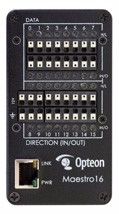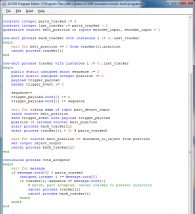Beyond PLCs
The Opteon Maestro® system is completely deterministic no matter how many combinations of input conditions must be continually tested in simultaneously.
While Programmable Logic Controllers (PLCs) are usually considered the gold standard for coordination of machinery in real time, in many applications they are simply not fast enough and lack the determinacy necessary to coordinate electronic imaging reliably with modern machinery.
Conventional PLCs rely on round robin service routines to implement sequential consideration of each unique condition among all of the asynchronous machine parameters that need to be considered. This sequential testing of input status determines a PLC’s “scan time” during which different state changes may not be handled in the order they occur and some of which may not be recognized at all until subsequent scan intervals. PLC scan times are usually in the range of tens of milliseconds, but since they are proportional to the number of conditions that must be monitored for a given machine they may be much longer when more than a small number of asynchronous inputs must be considered.
Consequently it is often impossible to rely on a PLC to consistently generate trigger signals accurate enough to reliably capture imagery precisely when the target part is in exactly the right location. The application-specific nature of PLC latencies are particularly problematic since it makes their delays very hard to predict. This creates the potential for timing holes whose consequences can be quite surprising to the system designer and may often yield unreliable behavior that is difficult to diagnose.
Fortunately the operation of Opteon Maestro® system coordinators is completely deterministic no matter how many combinations of input conditions must be continually tested simultaneously. Maestros will always respond to a new set of conditions as they evolve in the real world and deliver new control values within 1µS.
The Composer utility allows the development of SCORE language programs which provide straightforward natural language descriptions of even the most complicated, parallel, asynchronous, high speed systems. When these descriptions are compiled and loaded into one or more Maestro devices race-free operation is guaranteed.
This makes tracking parts through even the most complex machines and coordinating inspections at multiple locations in continuously running machinery straightforward and completely deterministic.


